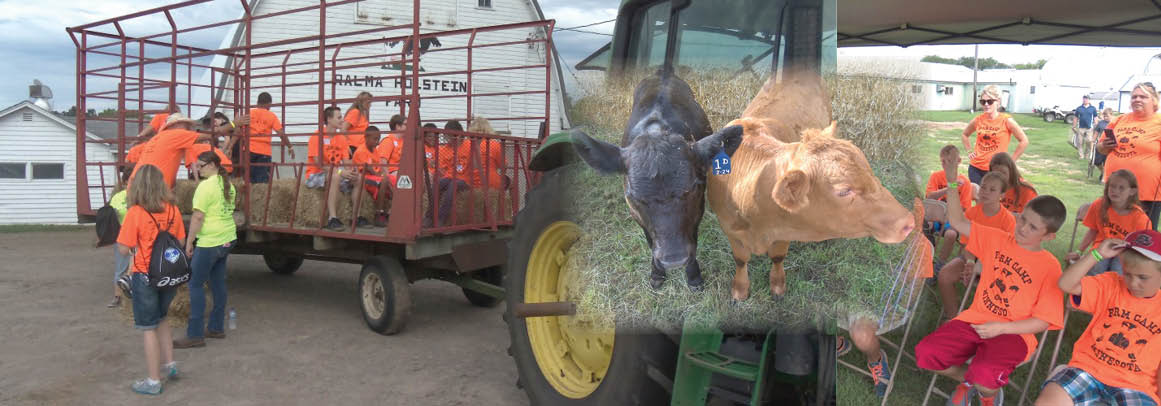by Dennis Dalman
editor@thenewsleaders.com
More than 120 students in a swarm of orange “Farm Camp” T-shirts descended upon the Mark and Natalie Schmitt dairy farm north of Rice on July 26 to learn about food, how it’s grown and raised, and all the work that goes into getting it to family tables.
It was one of three Farm Camp events throughout Minnesota this summer, the others at Waseca (two of them) and one near Dundas. Katie Schmitt, the daughter of Mark and Natalie, is the one who organized the Schmitt Farm Camp. She learned about the Farm Camps near Waseca, which began four years ago, and she began to think her family’s 100-herd Holstein dairy farm would be a good site for a Farm Camp and, judging by the students’ reactions, it was.
The Schmitt Farm Camp consisted of eight learning stations the eager, energetic students – grades 3-5 – visited in groups on a rotation basis. There were stations for beef cattle, dairy cows, pigs, poultry, pollinators (bee-keeping), corn, soy beans and gardening. At each station, the students heard a 15-minute talk with time for questions and answers and then had a chance to do some hands-on activities. For example, in the garden, they planted a row of peas.
They also had a hay-wagon tour of the farm, led by a John Deere tractor.
Instructors from throughout Central Minnesota taught the children at each station.
At the beef cattle station, for example, Sara Columbe from a Little Falls beef farm, showed the children items used in the production of beef cattle: bottles to feed milk-replacement formula, numbered ear tags, vaccine syringes, minerals, specialized reinforced foods and so forth. In a pen by the students were two beef cattle, a brown one and a black one, both Simmertals, a superb cattle breed that originated in western Switzerland during the Middle Ages, hundreds of years ago.
Columbe asked the children how much protein (specifically beef protein) it takes daily for a person to consume to stay healthy. The students guessed one pound, two pounds and more. The answer, said Columbe, holding up a pack of playing cards, is just three ounces, about the size of that pack of cards.
In the big garden, the students discovered beets, dill weed, corn, Brussels sprouts, broccoli and other nutritious goodies.
At the pollinator station, taught by the Schmitt’s son, Jonathon, a bee-keeper, the students were stunned to learn that one honey bee in its entire lifetime produces only 1 teaspoon of honey. However, he quickly added, a boxed hive can contain up to 80,000 bees. That’s a lot of teaspoons of honey, about 100 pounds of the sweet stuff produced per year.
The Farm Camp attracted groups of children from throughout Central Minnesota: Sauk Rapids, Pierz, Holdingford, Little Falls, St. Cloud and just about everywhere in between. They clearly enjoyed their knowledge intake and exploratory learning during the six-hour day, with lunch.
Katie Schmitt, who was a finalist for Benton County Dairy Princess in 2013, recently graduated from the University of Minnesota with a degree in animal science. She has landed a job as a communicator for World Dairy Expo in Madison, Wis., an organization that hosts a week-long expo in Madison attended annually by 70,000 visitors from all over the world and featuring cattle from both the United States and Canada.

It’s “all aboard” at the Mark and Natalie Schmitt dairy farm north of Rice July 26 as students climbed onto a haywagon for a tour of the farm. More than 120 children from all over central Minnesota showed up for the first Farm Camp to be held at the farm. Similar Farm Camps take place elsewhere in Minnesota, a way to bring city children into contact with the process of growing and raising foods.

Sara Columbe, a visiting beef-cattle raiser from Little Falls, shares with students the fine points of raising good, healthy, beef cattle, like the two in the pen – both young Simmertals, a superb breed of beef cattle.

Students examine the inside of a Brussels sprout plant in the Schmitt garden.

Students raise their hands with questions and answers as Jonathon Schmitt, a bee-keeper, informs them about the importance of pollination by little critters like bees. Jonathon is the son of Mark and Natalie Schmitt, who own the Schmitt Dairy farm north of Rice; and the brother of Katie Schmitt, who organized the Farm Camp for more than 120 area students.

Students get a chance to plant pea seeds at the Schmitt farm garden. The peas should be edible toward the end of September.

Students learn about how cows are milked outside the dairy building at the Schmitt Farm.

Two Holsteins, one a calf, the other a cow, peek warily at all the young visitors to the Schmitt farm for Farm Camp July 26. More than 120 children from throughout central Minnesota attended the educational event.

Two young beef cattle were admired by the visitors to the Schmitt dairy farm July 26. Both are Simmertals, an excellent breed of beef that originated hundreds of years ago in western Switzerland.




